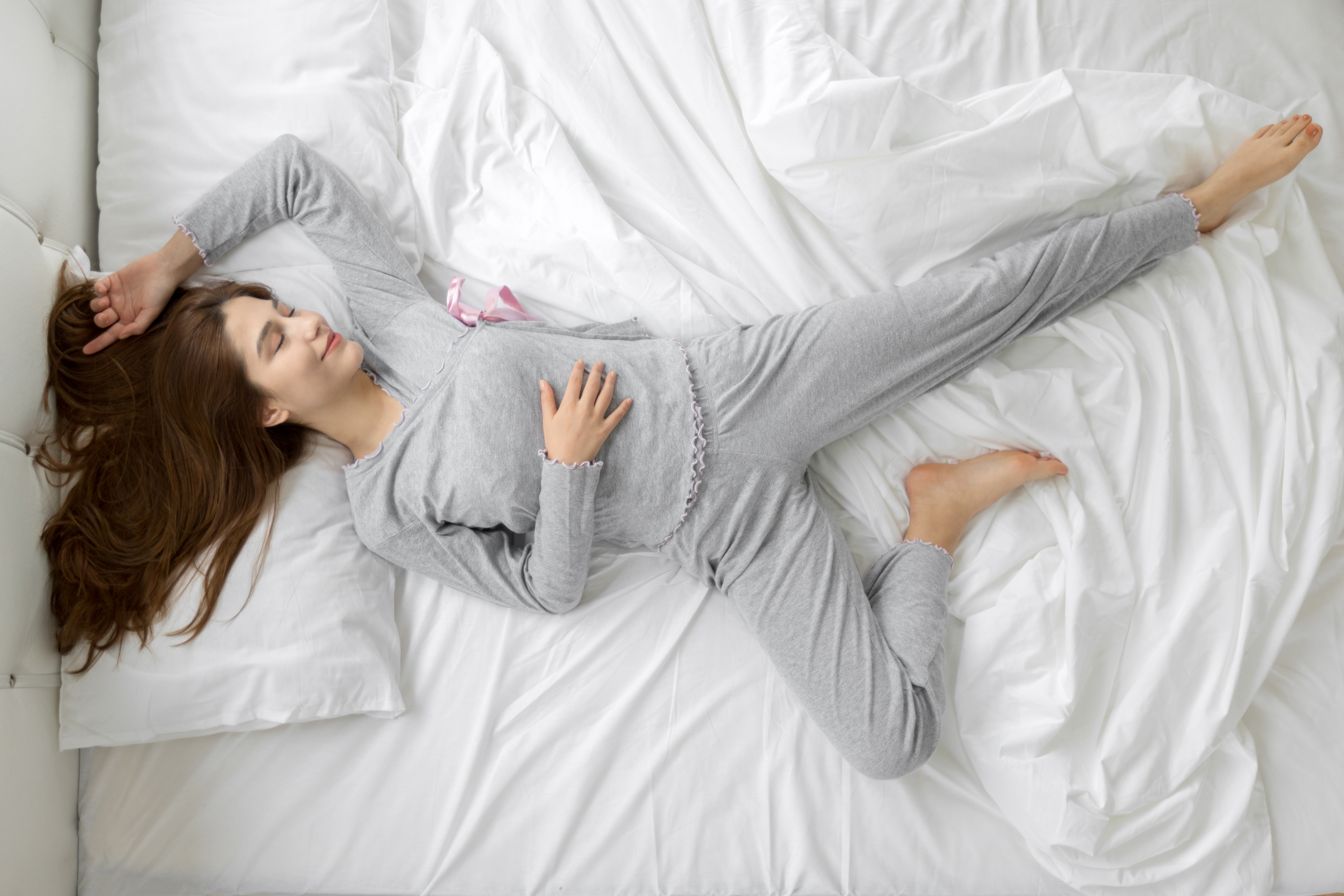Can you sleep on your stomach while pregnant? We ask three experts to share tips for a comfy pregnancy
Many women wonder 'Can you sleep on your stomach while pregnant?' - We find out for you...

'Can you sleep on your stomach while pregnant' is a question pondered by many a pregnant person, you are not alone in wondering if this is a safe position or not, especially if it's your go-to sleep stance pre-pregnancy.
Before you start researching and investing in the best cot mattress for your soon-to-be-born little one, take a look through our pregnancy pillow buys, some people swear by them for a comfy pregnant night's sleep.
And, while sleeping on your stomach is typically safe during the early stages of pregnancy, as your pregnancy progresses and your belly grows, it can become increasingly uncomfortable and potentially place pressure on your womb and other organs. It's best to find more comfortable sleep positions to ensure a restful night's sleep and support your changing body throughout pregnancy.
We ask three medical experts to share the lowdown on safe sleep practices during your pregnancy and for practical advice on getting comfortable in later pregnancy, as your bump grows, see what they tell us below.
Can you sleep on your stomach while pregnant?
Yes, it is safe to sleep on your stomach during pregnancy for as long as you want to, but you'll likely find that your growing bump, tender breasts, and backache make it more uncomfortable as your pregnancy progresses.
According to Midwife Pip, a practicing midwife, and podcaster, "While you can sleep on your stomach, most women will find as their breasts and bump grow, sleeping on their front is no longer comfortable or practical. So, although you may sleep on your front in the first trimester, as your pregnancy progresses, it is recommended to sleep on your side."
The Modern Midwife Marie Louise shares a similar perspective: "Until you have a bump, it's fine to sleep in whatever position you find most comfortable. Once you have a bump (timing around this varies significantly), you'll naturally assume more comfortable positions."
Parenting advice, hot topics, best buys and family finance tips delivered straight to your inbox.

Midwife Pip is a practicing Midwife Sister, Podcaster, Researcher and Mum. Currently working as a Delivery Suite Sister, she has a wealth of experience supporting thousands of women and parents to be through all aspects of pregnancy, birth and postpartum.

Is a midwife, mother to one with another on the way and author. She offers clinical expertise, guidance and support as both a midwife and hypnobirthing specialist. She understands the importance of being informed and empowered during this special time.
Why should I stop sleeping on my stomach during pregnancy?
While there is no specific medical or safety reason to stop sleeping on your stomach during pregnancy, it can start to feel "unnatural," according to Marie Louise. She explains, "Sleeping directly on your tummy will mean putting increased pressure on your baby. You may feel little feet or knees more, which can be uncomfortable and encourage the baby to change positions. Yet many mums tell me they wake up in all kinds of positions!"
You may have heard myths about sleeping on your stomach during pregnancy from other mums or well-meaning family members. Let's debunk four major myths:
1. Myth: Sleeping on your stomach can harm the baby.
Fact: As long as you feel comfortable, sleeping on your stomach is safe during the early stages of pregnancy when your bump is still relatively small. Your body naturally provides cushioning and protection for your baby.
2. Myth: Sleeping on your stomach can cause the umbilical cord to wrap around the baby's neck.
Fact: The position you sleep in does not cause the umbilical cord to wrap around the baby's neck (a condition known as the nuchal cord). Nuchal cords are common in pregnancy, affecting up to a third of babies in the womb, but they are usually harmless.
3. Myth: Sleeping on your stomach can lead to miscarriage.
Fact: No evidence suggests that sleeping on your stomach causes miscarriage. Miscarriages often occur due to chromosomal abnormalities or other factors unrelated to sleep position.
4. Myth: Sleeping on your stomach can restrict blood flow to the baby.
Fact: While ensuring proper blood flow to the baby is important, sleeping on your stomach does not significantly affect blood flow. As your pregnancy progresses, experts recommend sleeping on your side to optimise blood circulation. However, sleeping on your stomach earlier in pregnancy is unlikely to cause any issues.
What are the best sleeping positions during the first trimester?
"It’s best to tune into your body and get decent rest in a position you prefer,” says Marie Louise. “The more we tune into our bodies earlier in pregnancy, the better."
If you have any concerns or specific medical conditions, talk to your midwife or GP. Otherwise, try experimenting with different positions and use pregnancy pillows or cushions for support. Here are some positions to try that may help you get more comfortable in the first trimester;
- Side sleeping: Sleeping on your side is considered one of the best sleeping positions during pregnancy, particularly in your third trimester. This position improves blood circulation to your baby and helps prevent your womb from pressing on major blood vessels. Try placing a pillow between your knees and under your growing bump for added comfort and support.
- Semi-reclined: Some women find it comfortable to sleep in a semi-reclined position, propped up by pillows. According to the NHS, this can also help if you have heartburn or acid reflux, which are both common during pregnancy.
Sleeping on your back (not after 28 weeks): While sleeping on your back is generally considered safe during early pregnancy, avoiding this position after 28 weeks is crucial. Researchers have found that going to sleep on your back in late pregnancy can, sadly, raise the risk of stillbirth.
Dr Nauf AlBendar, Medical Scientist and Founder of the Womb Effect, explains why: “When a pregnant mum sleeps on her back, the baby tends to be less active and changes their heart-rate patterns. This might be due to the pressure on the main blood vessels that supply the womb, which restricts blood flow and oxygen to the baby.”

Dr. Nauf AlBendar is a medical scientist at the forefront of human health research. With a BSc in Molecular Genetics and Genomics, an MSc in Nutrition & Food Science and a PHD in clinical medicine, Nauf has developed a deep appreciation and understanding for the developmental origins of health and disease.
How long is it safe to sleep on my back while pregnant?
Until you reach 28 weeks of pregnancy. After this time, the risk of stillbirth increases if you sleep in this position. However, midwife Marie Louise suggests that it's beneficial to develop a habit of sleeping on your side even earlier than this to avoid a sudden change.
Marie Louise and Midwife Pip reassures Goodto.com readers that waking up on your back is not a cause for alarm. Marie Louise says, "Many mums tell me they wake up in a panic on their back, but there's no need to worry. You can't control the positions you assume while asleep." She adds, "I'm currently 35 weeks pregnant and wake up on my back all the time."
The key point to remember is to begin your sleep on your side, and if you happen to wake up on your back, there's no need to fret. Simply roll back onto your side and continue snoozing. Midwife Pip suggests using pillows to support your bump and placing a pillow between your knees for added comfort. These measures can help make the side sleeping position more comfortable and support any aches you may experience in your joints or back.
Why can’t I sleep on my right side while pregnant?
You can! In fact, it doesn’t really matter which side you sleep on - left or right. There was a small amount of research in the past to suggest that sleeping on the left side slightly reduced the risk of stillbirth, but this research hasn’t been borne out in later studies. Sleeping on the left side does, however, help your kidneys to get rid of waste products and fluids from your body, which Dr Nauf says can help with swelling in pregnancy.
The NHS reassures mums-to-be that sleeping on the left or right is perfectly safe, as do our expert midwives. Sleeping on either side is fine,” confirms Marie Louise. “The left side is preferable as this optimises blood flow. But if you find your right more comfortable - that’s fine too. Your rest and comfort are key.”
For more information about pregnancy health and symptoms, check out the NHS’s guide to pregnancy, labour and birth or visit Tommy’s PregnancyHub for advice on having a safe and healthy pregnancy.
Get more expert advice and information about sleep, from the best positions for a good night’s sleep to creating a safe sleeping environment for your newborn baby.
Video of the Week:
Joanne Lewsley is mum to a tween, and freelance copywriter and editor who creates parenting, health and lifestyle content for evidence-based websites, including BabyCentre, Live Science, Medical News Today and more.